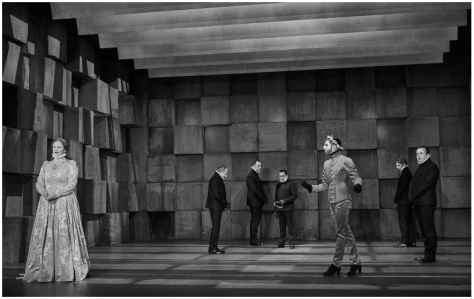If we don’t count Woyzeck at the Kammerspiele and at the Volkstheater (because one was only loosely based on the original script), Maria Stuart marks my first time seeing two different productions of the same play in German. In fact, Schiller’s Maria Stuart was one of the first plays I ever saw in German, just over a year ago in Vienna. That production—starkly minimalistic, sort of modern, and dramatically lit—was fabulous. So perhaps it was inevitable that I would be disappointed the second time around.
It’s not that Andreas Kriegenburg’s new production is bad. It’s my favorite show I’ve seen at the Kammerspiele so far. (I haven’t been lucky there, on the whole.) The abstract set serves as both a prison and a royal court, depending on the lighting. That lighting is noticeably terrible in the first scene (yes, it’s a dark prison, but I still want to be able to see the actors’ faces!), but improves thereafter. The historical costumes are gorgeous, with Elisabeth in a stunning yellow gown and red wig that contrast with Maria’s bald head and dirty shift. (She gets her own pretty red gown and blond wig after intermission, though.) The men are hard to tell apart in their Puritanical blacks—with the hilarious exception of the French ambassador, who sports a tight-fitting, lime-green, velvet suit.

The acting is a mixed bag. Many of the actors need better diction—I thought it was just my bad German and the bad acoustics at first, but then I realized I could understand Vincent zur Linden’s rapid French better than some of the actors’ German! (Believe me, my German comprehension is usually about an order of magnitude better than my French comprehension.) The actresses, however, speak loudly and clearly. They also steal the show. Annette Paulmann’s Elisabeth has a quiet intensity that demands respect. Her fury at Leicester’s betrayal fits her regal character; when she truly breaks, after she realizes all her advisors have abandoned her, she is reduced to nodding and nervous hand-clasping. Brigitte Hobmeier’s Maria is Elisabeth’s opposite in appearance and character—short, blond-wigged, and fiery in both her conviction that she has been wronged and her trust in her promised saviors. She is just as intense as Elisabeth, but rarely quiet. Hobmeier seems to especially relish the wittily phrased insults she gets to throw at Elisabeth during their famous confrontation.

Among the men, Edmund Telgenkämper (Davison) deserves a mention for how wonderfully lost he seems when given the unenviable task of interpreting Elisabeth’s intentionally vague orders. Oliver Mallison also stands out as the daring Leicester, who tries to woo two queens at once but loses both. He is suave and gallant enough to get into such a romantic tangle and (partially) talk his way out of it, but callous and violent in his political maneuvering. Not only does he betray Mortimer to Elisabeth (in the script), he also forces poison down Mortimer’s throat to prevent him from ratting Leicester out (not in the script). This scene is awesome for him (he sings “Ich bin verloren” (“I am lost”) repeatedly as he takes out the poison, and he seems ready to drink it himself before he suddenly turns and overpowers Mortimer), but it’s really unfortunate for Mortimer. Not in that it kills him—Mortimer dies in the original script, too. But there, he commits suicide, dying free (he vaunts that he “won’t even owe his death” to the traitorous Leicester) and atoning for his failure to save Maria. His character arc somehow seems incomplete if he is murdered instead. Then again, Max Simonischek’s Mortimer never seemed quite right to me anyway. In my mind, Mortimer is the noble hero. Simonischek’s Mortimer is more than a little insane, with jerky movements and a wild look in his eyes. His attack of Mary at the end of act III (in the script, it consists of no more than “pressing her to his bosom,” but here it’s more violent) seems consistent with his character rather than a temporary madness.

Maria Stuart is a hard play, largely because of the characters and their relationships. Everyone has deep flaws, and no one is close to anyone else unless s/he has a political goal. Elisabeth and Maria have the most sparks flying between them, but they only get one scene together. In the end, it’s hard for audience members to know whom to sympathize with and what to hope for. In the past, I’ve cheered for the Mortimer-Maria alliance and despised Leicester. Here, I still despised Leicester, but I didn’t have anyone to cheer for. Without a deep investment in a particular character or relationship, I was left admiring a prettily staged story but emotionally unmoved. That’s not quite right for a Schiller tragedy.

(A note to Portland readers: NWCTC is opening a production Mary Stuart (in English) later this month. My reservations about the Munich Kammerspiele’s particular staging not withstanding, It’s a fabulous play that is rarely performed in the States, so you should go see it!)